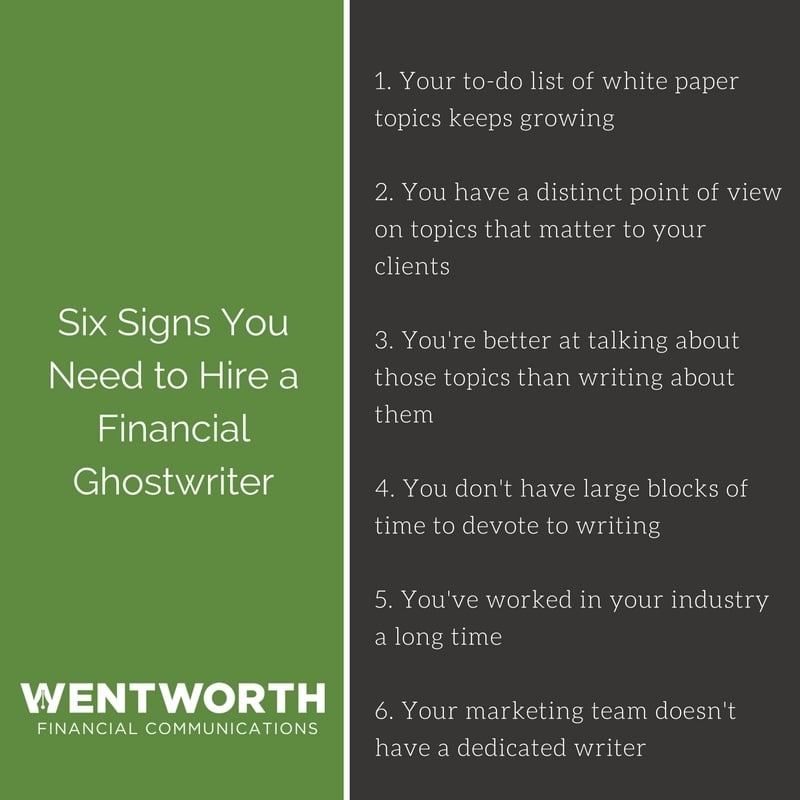How do you know when it’s time to hire a financial ghostwriter to help with your thought-leadership efforts? Maybe you saw your competitor generating a lot of attention by posting a thought-provoking white paper on their LinkedIn page. Possibly you’ve seen a colleague’s byline in the op-ed section of a highly regarded industry publication. Maybe you were at a conference and saw a speaker generating a slew of new prospects by inviting people to download their e-book. Or maybe you’re looking at a lofty new client acquisition goal and wondering what you can do to get yourself to that level.
In all of these scenarios, it’s likely that a ghostwriter (or freelance writer) can be an important part of the solution, and there are lots of ways you can work with a ghostwriter. But does making the investment to bring on a ghostwriter who specializes in the financial services industry make sense for you?
Here are six signs that you may be ready to hire a ghostwriter:

- Your to-do list of topics for white papers and blogs keeps growing
If you recognize the value of content marketing or thought leadership in building your brand, at one point you probably started a list of topics that would be good to write about in white papers, blogs, e-books, or newsletter articles. But you probably also found that when it comes to something as labor-intensive as writing, it’s a lot easier to add topics to your to-do list than it is to check them off.
Maybe you have several white papers started, but they were put on the backburner once you got busy with other projects. Or maybe you couldn’t figure out how to get past the brainstorming phase.
One of the biggest values that a ghostwriter brings is project management. It’s incredibly valuable to have someone who is 100% focused on getting the project across the finish line. Not only will the writer have a special skillset in writing in a way that brings your ideas to life, but she or he also will know how to manage all of the non-writing aspects of the project and meet the deadline.
- You have a distinct point of view on topics that matter to your clients
Some people focus their marketing efforts on forwarding articles and retweeting. But if you want to be seen as a thought leader, you need to demonstrate a unique perspective. And if you have a distinct point of view and insights that are valuable to your clients, then working with a ghostwriter to frame those ideas and add depth can be a good investment.
Not everything you write has to be 100% original. Some of the best pieces of thought leadership are articles tackling a topic that has already garnered a lot of attention – but the author is able to show how the current conversation is somehow incomplete or misguided. You can use what others have written as the foundation, but you still need to advance the conversation. A good ghostwriter can dig into a topic to round up additional research or interview subject matter experts to help you articulate and substantiate your unique perspective.
- You’re good at talking through topics with clients but not writing about those topics
Writing can be a daunting process for many people; this can be especially true for quantitative-minded people. Most bankers, portfolio managers, financial advisors, and analysts can easily sit down and provide a brilliant, compelling explanation of a complicated topic in a one-on-one conversation. But putting those ideas into written form requires a very different skillset.
A good ghostwriter can sit down with you and have a conversation about the topic, then turn your ideas into a well-written piece that conveys your expertise and works well in whatever format you require: white paper, blog, newsletter, etc.
- You never have large blocks of time that you can devote to writing
Writing a polished article, whitepaper, or blog post isn’t something you can work on a little bit at a time. It’s almost impossible to do it well if you only spend 30 minutes here and 30 minutes there. Most financial services professionals aren’t able to block off big chunks of their day to dedicate to writing. But an outsourced writer is able to devote the undivided time and attention necessary to your project.
- You’ve worked in your industry for a long time
Your experience in the financial services industry is your greatest asset when it comes to thought leadership. But it also can be a potential roadblock to creating good content. When you’ve worked in one industry for a long time and you’re an expert, it can become difficult to understand what others (i.e., your clients and prospects) don’t understand. It’s easy to fall victim to the “curse of knowledge.”
A ghostwriter or outside writer can help identify what level of background explanation is necessary and what needs to be spelled out. You might use EBITDA, CFPB, and FINRA 50 times a day, but that doesn’t mean that your target audience knows what those acronyms mean. You may understand that “financial sponsor” and “private equity firm” mean the same thing, but does the reader? A ghostwriter also can help you by pulling out the “lead” in what you have to say and crafting your ideas in a way that is relevant and actionable for your audience. Sometimes it takes an outsider’s perspective to help identify why your audience should care about what you have to say.
- Your internal marketing team doesn’t have a dedicated financial writer
Just because you have an internal marketing department, it doesn’t mean they can handle the kind of writing necessary for your thought-leadership pieces. There’s a big difference between writing copy for a marketing brochure and writing a white paper that draws heavily on quantitative analysis. Your marketing team may have people who specialize in branding, project management, design, customer research, strategy, and digital, but the department may not have dedicated writers. In these situations, it can be helpful to augment the internal team’s capabilities and skillsets with an outsourced, and expert, writer.
About the Author
 Scott Wentworth is the founder and head writer of Wentworth Financial Communications. He has served as a ghostwriter for portfolio managers, investment bankers, attorneys, and other thought leaders across the financial services industry. It took all the willpower he could muster to not include “Who You Gonna Call?” in the title of this blog post.
Scott Wentworth is the founder and head writer of Wentworth Financial Communications. He has served as a ghostwriter for portfolio managers, investment bankers, attorneys, and other thought leaders across the financial services industry. It took all the willpower he could muster to not include “Who You Gonna Call?” in the title of this blog post.
